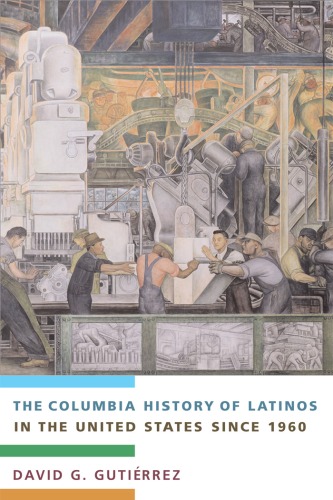

Most ebook files are in PDF format, so you can easily read them using various software such as Foxit Reader or directly on the Google Chrome browser.
Some ebook files are released by publishers in other formats such as .awz, .mobi, .epub, .fb2, etc. You may need to install specific software to read these formats on mobile/PC, such as Calibre.
Please read the tutorial at this link: https://ebookbell.com/faq
We offer FREE conversion to the popular formats you request; however, this may take some time. Therefore, right after payment, please email us, and we will try to provide the service as quickly as possible.
For some exceptional file formats or broken links (if any), please refrain from opening any disputes. Instead, email us first, and we will try to assist within a maximum of 6 hours.
EbookBell Team

4.3
38 reviews
ISBN 10: 0231118090
ISBN 13: 9780231118095
Author: David Gutierrez
Latinos are now the largest so-called minority group in the United States―the result of a growth trend that began in the mid-twentieth century―and the influence of Latin cultures on American life is reflected in everything from politics to education to mass cultural forms such as music and television. Yet very few volumes have attempted to analyze or provide a context for this dramatic historical development. The Columbia History of Latinos in the United States Since 1960 is among the few comprehensive histories of Latinos in America. This collaborative, interdisciplinary volume provides not only cutting-edge interpretations of recent Latino history, including essays on the six major immigrant groups (Mexicans, Cubans, Puerto Ricans, Dominicans, Central Americans, and South Americans), but also insight into the major areas of contention and debate that characterize Latino scholarship in the early twenty-first century.
This much-needed book offers a broad overview of this era of explosive demographic and cultural change by exploring the recent histories of all the major national and regional Latino subpopulations and reflecting on what these historical trends might mean for the future of both the United States and the other increasingly connected nations of the Western Hemisphere. While at one point it may have been considered feasible to explore the histories of national populations in isolation from one another, all of the contributors to this volume highlight the deep transnational ties and interconnections that bind different peoples across national and regional lines. Thus, each chapter on Latino national subpopulations explores the ambiguous and shifting boundaries that so loosely define them both in the United States and in their countries of origin. A multinational perspective on important political and cultural themes―such as Latino gender systems, religion, politics, expressive and artistic cultures, and interactions with the law―helps shape a realistic interpretation of the Latino experience in the United States.
Chapter 1: Globalization, Labor Migration, and the Demographic Revolution: Ethnic Mexicans in the Late Twentieth Century
Chapter 2: Social Polarization and Colonized Labor: Puerto Ricans in the United States, 1945–2000
Chapter 3: Exiles, Immigrants, and Transnationals: The Cuban Communities of the United States
Chapter 4: Central American Immigrants: Diverse Populations, Changing Communities
Chapter 5: Transnational Ties and Incorporation: The Case of Dominicans in the United States
Chapter 6: The Other "Other Hispanics": South American-Origin Latinos in the United States
Chapter 7: Gender and the Latino Experience in Late-Twentieth-Century America
Chapter 8: From Barrios to Barricades: Religion and Religiosity in Latino Life
Chapter 9: U.S. Latino Expressive Cultures
Chapter 10: The Continuing Latino Quest for Full Membership and Equal Citizenship: Legal Progress, Social Setbacks, and Political Promise
Chapter 11: The Pressures of Perpetual Promise: Latinos and Politics, 1960–2003
the columbia history of latinos in the united states
the latino experience in u.s. history
latino history in the united states
a latino history of the united states smithsonian
the columbia history of american television
Tags: David Gutierrez, Columbia, Latinos